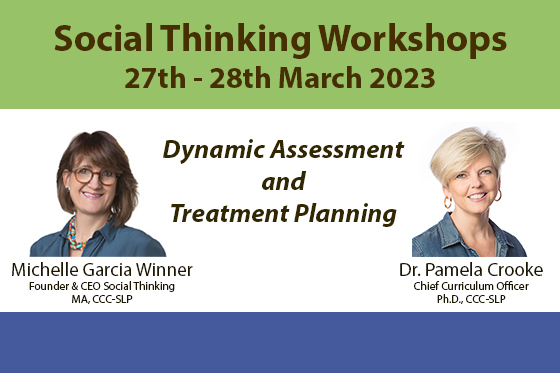

Day 1 | Monday March 27th, 2023
Using the Social Thinking® Dynamic Assessment to Guide Teaching Strategies
Most of us can walk, skip, and run, but few of us can explain how we do this. It’s the same when it comes to our social selves. While we participate with others in our community, most of us can’t explain how we do this. In this course, we will demonstrate and explain practical assessment ideas, tools, and tasks to explore some of the many foundational competencies which help us to form and maintain relationships with classmates or friends. We’ll show how to implement and analyze findings from four informal assessment tasks found in the Social Thinking Dynamic Assessment. We’ll include video footage of actual dynamic assessments to reveal how individuals process and respond to social information in real time.
There is so much to explore within the social world to better understand how individuals we work or live with process and respond to socially based information that is foundational for development and expansion of their social competencies as they age. This talk has evolved and expanded across the years, and it incorporates the use of practical and easy-to-access materials, such as static socially based pictures, as well as movie, TV, or YouTube clips. The bullets below summarize the strategies we’ve developed over the past 26 years to help both professionals and parents (e.g., general education and special education teachers, speech-language pathologists, occupational therapists, administrators, social workers, psychologists, counselors, therapists, behavior therapists, other family members) learn concrete ways to explore the abstract nature of the social mind. The information can be used with children and adults, starting at age four, who have solid to strong expressive and receptive language abilities. The goal is to help all conference attendees learn strategies to unpack abstract aspects of the social world, not only to better understand the individuals with whom we live or work, but also figure out what type of lessons will benefit these individuals moving forward. The following are some of the many points we will cover during this course:
Learning objectives:
Day 2 | Tuesday March 28th, 2023
Individualizing Social Emotional Learning and Treatment Decision Making
Knowing what to teach to whom can be complicated as the social world is complex! In Day 2, we will explore a unique six-step decision-making template. The goal is to guide individualized teaching planning to foster social development across different social learning styles.
We will present evidence-based frameworks explaining how the social world works before expecting self-regulation. This decision-making template can be used by professionals and parents who work hands-on with students to individualize social emotional supports. Using the template, we will explore how to layer and combine teaching tools within a Social Thinking-based teaching model. We will discuss how and why choices were made, what was taught to the social learner, and how the sessions evolved based on the input and responses of students. We will explore individualized case journeys.
We will begin by explaining key conceptual frameworks from the Social Thinking Methodology to help interventionists understand the social learning needs of a variety of learners. We will provide a problem-solving and planning template to teach about how the social world works prior to expecting individuals to work in the social world (navigate to regulate).
Treatment sessions require the interventionist incorporate many different islands of knowledge to bring alive a treatment plan. In this course, we will explore how to bundle and layer treatment concepts, frameworks, and strategies from the Social Thinking Methodology. How do we decide what to do when? The combination of treatment tools will be anchored on a social learner’s age, personality, social learning strengths/challenges, developmental abilities, and mental health challenges.
We will review a planning and treatment journey to demonstrate the application of the six-step clinical decision making template over time. Watching a clinical case study, or “case journey,” unfold overtime can be very informative and powerful—and gaining tools to unpack the case journeys of the individuals you support is even better. We will discuss treatment pathways for younger students and how these needs transform and change with developmental age and evolving social emotional self-regulatory expectations. The following are some of the many points we will cover during this course:
*Treatment refers to using conceptual and strategy-based frameworks to help individuals improve their social competencies.
Learning objectives:
Fee:
(Includes handouts, lunch and tea breaks)
Register here: https://forms.connectandcommunicate.com.sg/CandC/form/SocialThinkingWorkshops20232728Mar/formperma/yksbNaXcO1hy6uY9uR8nVusrlHWDhEr9rnelUvic-CQ